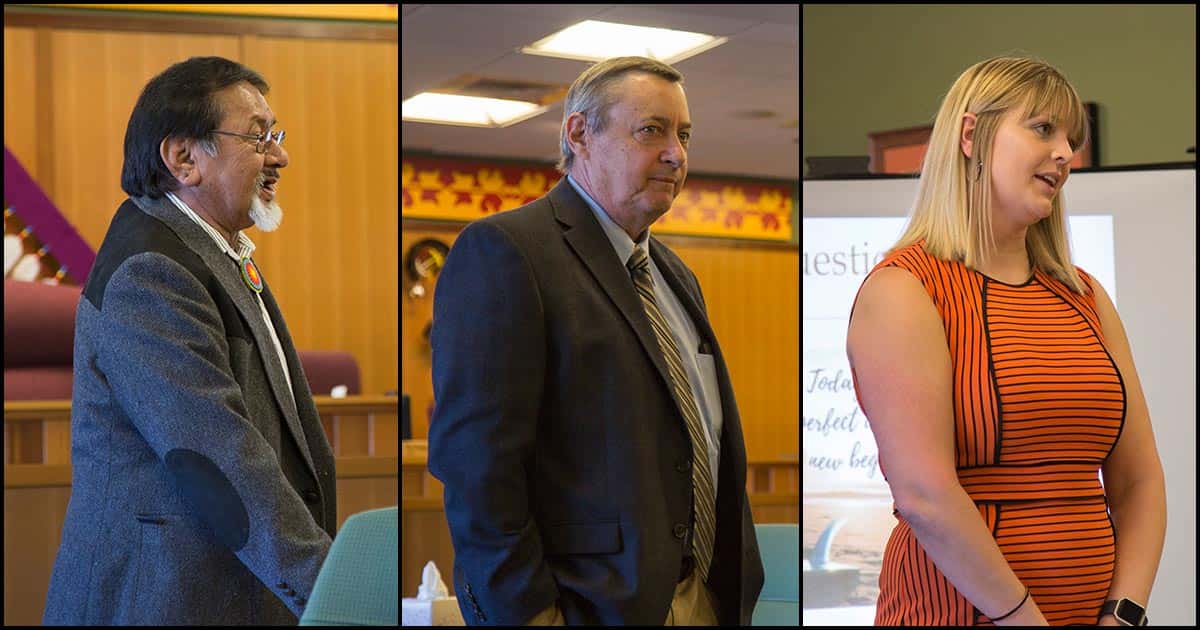FCP Chief Judge,
Eugene White-Fish
Forest County Circuit Court Judge,
Leon Stenz
FCP Wellness Court Coordinator,
Valerie Loduha
.entry-date::after {content: ” by Val Niehaus”;}
It is common knowledge that drug- related incidents have been becoming a more frequent occurrence in Forest County over the last couple of years. These matters do not just hurt the individuals who are actually involved in the crime itself, but they affect others in a multitude of ways. The immediate and extended families of these people are affected in many ways. In addition, everyone in the county is also affected because of the need to pay higher taxes for all that is involved in dealing with drug-related issues. As was explained by the wellness court team, this initiative is being offered first as something to help number one— “the addict”—but also to address the needs of number two— “the community”. The Forest County Potawatomi (FCP) Tribal Court and the Forest County Circuit Court have come together as partners to help these individuals and all who are affected by their problem.
On Feb. 23, 2017, an open house was held at the FCP Tribal courtroom to tell the community about this new strategy which is a project that has been in the works since 2014. Both courts had developed an interest in this program and actually shadowed the Leech Lake Wellness Court to learn more about the process. A three-year planning grant was awarded in October 2014 and from there the teams took off with the goal being to learn all they could about wellness courts. During the open house, FCP Chief Judge Eugene White-Fish expressed his thoughts by saying, “This has to be a sincere commitment of the individual because if the team feels that you don’t qualify during this program, they will discharge you. We are looking for the ones who take this seriously, and they will be the ones who make it through. We hope they will change their lives around.”
Forest County Judge Leon Stenz was next to talk with the audience saying, “A drug court is extensive supervision where we take evaluations of those who we think are most in-need and most at-risk, and we attempt to make a difference in their lives. There are no less than five cases each week that I see in my court that are drug-related. Without addressing the underlining problem, which is the addiction, this will continue. It is hopeful that this program will help break that cycle of the addiction problem, and these people can change their life around.”
Valerie Loduha is the FCP tribal court wellness court coordinator, and she has been working diligently on developing the stages of this program with many others who are involved. Loduha offered an informational presentation to the people present at the open house and went into considerable depth discussing all of the qualifications that are needed and what will be expected from the people who are enrolled in such a program.
This program is currently open for 10 participants. This is on a volunteer basis, and an individual must fulfill the expectations of this program. If they do not, that person will then be sentenced to what has been ordered by the court. The program will last anywhere from 18-30 months, and the person will either complete this program or be discharged. The first hearing will be taking place within the next couple of weeks.
The qualifications for eligibility to proceed in this program are as follows: You must be 18 years of age or older; you must be a resident of Forest County; you can be native or non-native; you must be convicted and have a history of criminal drunk driving (2-3), illegal substance charge and/or alcohol/drug-driven crimes; you must not be a violent offender as defined by the federal definition; you cannot be a sex offender; and you must voluntarily agree to participate in the Wellness Court program. Again, these are just “some” of the rules to be eligible.
Involvement in this program will include assessment of the participant’s needs and a treatment/case plan will then be created. Intensive supervision and case management will be done for each individual. There will be frequent and random drug testing as well as AODA treatment with a focus on collaboration among agencies. Expectations for the participants in this program are set very high, and it will not be easy for everyone to comply. But if just one gets through this program, it will be worthwhile. The team says, “Show up. Try. Be honest.”
This wellness court can and will be a life-changing program for the individuals involved. It will help them become able to live a sober life and enable them to have a future as reputable citizens of this community. It will help the individuals themselves and thereby it will also help their families who have already suffered so much along with them as they battled this all too-common problem.

